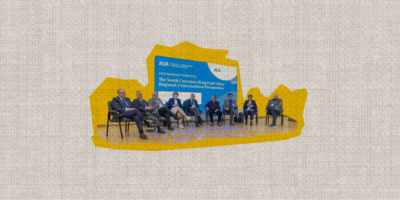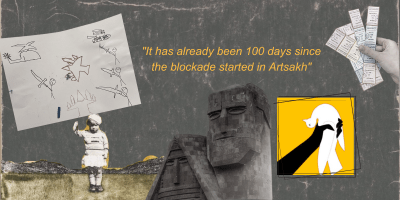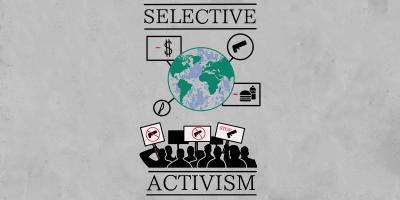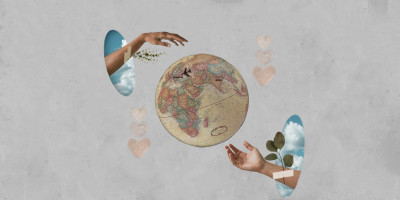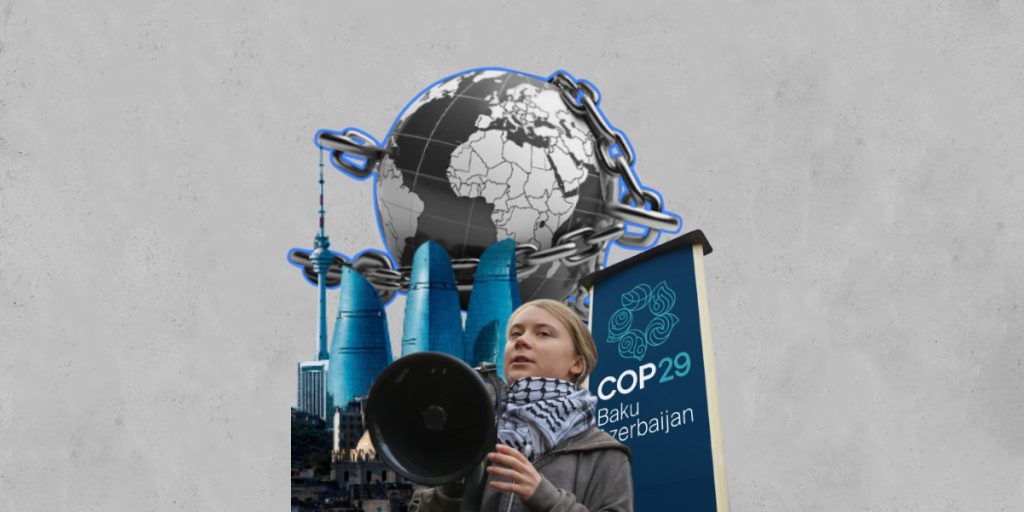
International peace conferences can have fallacious intentions, especially when Aliyev’s dictatorial regime is its host, creating a platform for greenwashing its war crimes, violations of international humanitarian law, and ethnic cleansing in Artsakh.
“Don’t bring your human rights concerns to Azerbaijan for COP29,” foreign policy chief Hikmet Hajiyev declared as the wave of criticism hit its government months ahead of the annual UN climate change conference.
From Nov. 11-22, Baku hosted The 29th annual Conference of the Parties of the United Nations Framework Convention on Climate Change (COP29). Its objective was to unite government, business, and civil society leaders to bring solutions concerning “finance for developing countries to drastically reduce greenhouse gas emissions and protect lives and livelihoods from the worsening impacts of climate change.”
Of course, Aliyev’s dictatorial government received global condemnation for being chosen to host this event, considering its wealth from oil and natural gas reserves. According to the International Trade Administration, “Azerbaijan’s economy is anchored in oil and gas production, which accounted for roughly 47.8% of the country’s GDP and over 92.5 % of export revenue in 2022.”
The International Trade Administration also states that the Southern Gas Corridor (SGC) pipeline delivered 11.4 bcm (billion cubic meters) of local gas from Azerbaijan to Turkey and continued to European markets in 2022. This makes Azerbaijan a net energy exporter, as its production and export of crude oil and natural gas are central to its economy and government revenues.
International organizations must meticulously document pollution trends affecting the country’s population due to its heavy reliance on fossil fuels. Recent statistics reveal Azerbaijan’s abnormally high levels of greenhouse gas and carbon dioxide emissions due to intensive oil and gas extraction leading to air pollution.
In parallel to COP29, AUA hosted a conference titled “The Impact of Azerbaijan’s Aggression on Human Rights and Environmental Protection” on Nov. 14, 2024. It addressed concerns about the UN’s choice to designate Azerbaijan as the COP29 host despite its war crimes and Armenophobia rhetoric.
In light of AUA’s event, Greta Thunberg, an internationally renowned Swedish climate activist, participated in the panel discussions. She emphasized climate justice and human rights. “We need to stop holding climate conferences in countries like Azerbaijan, which severely oppresses its population,” she asserted.
Thunberg went on to denounce Azerbaijan’s actions, including the ethnic cleansing of Artsakh’s population, its military aggression, and extensive human rights abuses such as torture, hostage-taking, and systemic violence. She concluded with a powerful message: “If we are advocating for justice, it must be justice for all.”
Dr. Yevgenya Paturyan, Chair of the Politics and Governance program, shares that “it’s counterproductive to allow petroleum states to host this particular summit.”
Moreover, by granting a platform to petroleum-rich nations, the international community risks legitimizing their unsustainable practices and diverting attention away from meaningful climate solutions. “Azerbaijan has completely discredited itself,” she adds.
Many governments have been vocal in their condemnation of COP29, considering Azerbaijan’s long-standing record of human rights violations and ethnic cleansing in Artsakh.
U.S. Democratic Senator Ed Markey urged the de facto Biden administration and the international community to leverage COP29 as an opportunity to advocate for the release of all prisoners of war and hostages detained by Azerbaijan.
Additionally, eight French officials wrote an opinion piece “COP 29 in Baku, a Meeting of Shame and Dishonor” for La Tribune Dimanche, expressing their agitation.
Apart from state officials, international news outlets reported on global opinions on COP29 with headlines ranging from “COP29 is a hot mess” to “A total waste of time.”
The UN failed to address the human rights question on the international organizations’ front when appointing Azerbaijan as the COP29 host. “It’s disheartening because the UN is already facing serious criticism for its inability to lead the world to a better place,” Dr. Paturyan says.
Narek Ohanyan, CS junior, and climate activist, condemns Azerbaijan hosting the climate change summit and emphasizes Azerbaijan’s human rights violations against Armenians and the ethnic cleansing of the indigenous Armenians of Artsakh. He explains that these actions violate and disregard the UN’s democratic and humanitarian values.
According to Ohanyan, hosting this particular summit in a dictatorial and aggressive state “undermines the credibility of COP29 and risks overshadowing the conference’s mission to address the global climate crisis.”
While COP29 presents controversies about its objectives and credibility, the UN must review its criteria and procedure when designating a country to host the summit.
Ohanyan explains that choosing a corrupt and malicious country like Azerbaijan disregards both environmental and human rights standards, while such conferences should serve as a platform to “amplify Armenian voices and push for justice.”
This event gives a dangerous message: Such international conferences risk becoming hollow platforms for greenwashing and power posturing.

